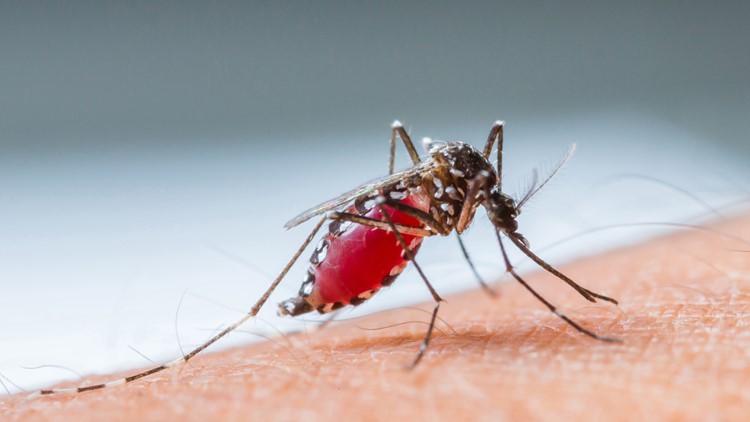MICHIGAN, USA — Michigan is experiencing another outbreak of Eastern Equine Encephalitis (EEE). The mosquito-borne virus is incredibly deadly and health experts warn people to protect themselves from bites to avoid infection.
WHAT IS EEE?
Eastern Equine Encephalitis is a virus carried by mosquitoes. It is one of the most dangerous mosquito-borne viruses with a 90% fatality rate in horses and 33% fatality rate in humans who contract the virus and exhibit symptoms.
People younger than age 15 and over age 50 are at greatest risk of severe disease following infection. Only about 4-5% of humans who are infected will develop illness from the virus.
It is transmitted through mosquito bites.
WHAT ARE THE SIGNS AND SYMPTOMS OF EEE?
Most people who are infected will not develop any symptoms.
For those who do develop symptoms, they will most commonly develop chills, fever, weakness, muscle and joint paint. Illness can last for up to two weeks. In these mild cases, people will recover completely, but fatigue can last for weeks.
In the most serious cases, people can develop a serious neurological illness such as encephalitis or meningitis. Symptoms of this can include high fever, headache, irritability, restlessness, drowsiness, anorexia, vomiting, diarrhea, bluish discoloration of the skin, convulsions and coma.
Recovery, in these severe cases, can take several weeks and many are left with disabling and progressive mental and physical sequelae. About 30 percent of the people who experience this due to EEE will die.
There is no human vaccine for EEE. There is no specific antiviral treatment either.
HOW TO PROTECT YOURSELF AND PETS FROM EEE?
The Michigan Department of Health and Human Services offers these tips to protect yourself from mosquito bites.
- Avoiding being outdoors from dusk to dawn when mosquitoes that carry the EEE virus are most active.
- Apply insect repellents that contain the active ingredient DEET, or other U.S. Environmental Protection Agency-approved product to exposed skin or clothing, and always follow the manufacturer’s directions for use.
- Wear long-sleeved shirts and long pants when outdoors. Apply insect repellent to clothing to help prevent bites.
- Maintain window and door screening to help keep mosquitoes outside.
- Empty water from mosquito breeding sites around the home, such as buckets, unused kiddie pools, old tires or similar sites where mosquitoes may lay eggs.
- Use nets and/or fans over outdoor eating areas.
Mosquito-borne illnesses are a risk in Michigan until nighttime temperatures consistently fall below freezing.
To protect your horses and other domestic animals (such as dogs, sheep, and goats), measures could include the following:
- Talking to a veterinarian about vaccinating horses against EEE.
- Placing livestock in a barn under fans (as mosquitoes are not strong flyers) during peak mosquito activity from dusk to dawn.
- Using an insect repellent on an animal that is approved for the species.
- Eliminating standing water on the property—i.e., fill in puddles, repair eaves, and change the water in buckets and bowls at least once a day.
- Contacting a veterinarian if an animal shows signs of the illness: fever and stumbling, which can progress to being down and struggling to stand.
RELATED: Michigan health department asks local officials to reschedule outdoor activities as EEE cases rise
WHAT HAPPENED IN 2019?
In 2019, Michigan experienced its worst outbreak of EEE. At the end of August, six horses died from the virus in West Michigan and cases spread from there.
At the end of the year, the state recorded 10 human cases, six of whom died, and and 50 cases in animals across 20 counties. The number of human cases exceeded the previous 10 years combined. Last year, Michigan accounted for 25% of all the EEE cases nationwide.
The Michigan Department of Health and Human Services said there's no exact reason why some years are more severe than other, but weather, including temperature and rain, are all believed to be factors.
Throughout last fall as cases continue to rise, the state ended up doing aerial spraying in 14 counties. This was the first time the state health department and local officials sprayed for EEE since 1980.
People in the most affected counties were advised against spending time outdoors after dark. Evening activities, like high school football games, were moved up to take place before dusk.
Typically, mosquito-borne illnesses, including EEE, will continue to pose a risk to both animals and humans until about mid-October after there has been at least two hard frosts.
If you have questions about EEE, you can call the MDHHS hotline at 888-535-6136 which is open from 8 a.m. to 5 p.m. Monday through Friday.
►Make it easy to keep up to date with more stories like this. Download the 13 ON YOUR SIDE app now.
Have a news tip? Email news@13onyourside.com, visit our Facebook page or Twitter. Subscribe to our YouTube channel.



